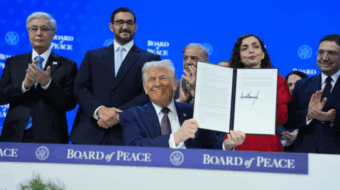
Tensions ease with release of British sailors, but U.S. war threats vs. Iran remain
While the Bush administration continues to press confrontation with Iran over its nuclear program, war fears eased slightly with the April 4 announcement by Iranian President Mahmoud Ahmadinejad that Tehran would release 15 British sailors and marines it had seized last month in the Persian Gulf, ending a tense dispute with the British government.
Iran said the British military vessel had crossed into Iranian waters, but Britain insisted the ship was patrolling in Iraqi waters. Experts say there is no clearly defined boundary in the area. Phyllis Bennis, of the Institute for Policy Studies, said the incident “may well not have been a deliberate British provocation,” beyond the “normal” provocative nature of the U.S.-British military presence in the Gulf, including boarding and inspecting ships, “but that doesn’t mean it isn’t dangerous.”
Two weeks ago the U.S. mounted its largest display of military force in the Persian Gulf since the invasion of Iraq, using 15 warships and 100 aircraft to simulate attacks near the coast of Iran. More than 10,000 U.S. personnel were involved in the “war games.”
But despite the tense atmosphere, Iran and Britain engaged in talks on the seized British sailors and marines and gradually softened their stances. Iran, which had threatened to put the 15 on trial, was the first to back off, saying that it would work with Britain diplomatically to resolve the issue. And Britain, despite its original inflammatory rhetoric, pursued diplomacy — a different path than the Bush administration appeared to want.
Rostam Pourzal, an Iranian-American peace and human rights advocate who heads the Campaign Against Sanctions and Military Intervention in Iran, told the World, “I’m very happy that the leaders in Iran are wise enough not to try to exploit this situation more than it’s worth.” He added, “I think they were looking for a [public relations] victory for domestic consumption and for scoring points with the global south.”
Pourzal and other peace activists say the ongoing standoff between the U.S. and other world powers and Iran over Iran’s nuclear program is being fanned by U.S. provocations and by provocative rhetoric by Iran’s theocratic regime.
Pourzal, who worked with the Fellowship of Reconciliation to send U.S. goodwill delegations to Iran, said that the Bush administration is “itching to do regime change in Iran; few people doubt that.” But he added that public sentiment can have an effect on U.S. actions. President Bush will decide which course to pursue based on “whether he thinks it is going to damage the Republican Party’s chances or not,” he said.
A joint statement of 28 communist and workers parties from Europe, the Middle East and Africa, issued March 18, said the nuclear issue “is only a cover for the U.S. attempts to secure control over an area of the Middle East that is best situated to control the production and export of energy resources from this part of the world.” The parties declared their firm opposition to any military action against Iran.
Pourzal agreed, noting, “Iran is the last standing domino in the Middle East in this oil rich region.” Current developments are related to a longer-term U.S. strategic policy, he said. “Iran is the key to controlling the rest of Asia for decades to come.”
“The prize is China, which is going to be the next superpower, 15 to 20 years from now,” Pourzal said. U.S. ruling circles “know that in order to have a choke-hold on China they need to increase the West’s control of the energy market on which China is so dependent.”
Fears of war have risen since the U.S. pushed resolutions through the UN Security Council imposing sanctions on Iran. Iran has said it will not comply with the resolutions’ conditions.
The communist and workers parties’ statement noted that the Bush administration and Iran’s reactionary leadership are, in some ways, helping one another. While strongly condemning U.S. saber-rattling, the statement said, “We also express our concern over the provocative and unacceptable statements from the Iranian president.” These “have provided the U.S. and its allies, in particular the Israeli government, with the excuse to continue their provocations against Iran. The Iranian regime is exploiting the current situation to extend its suppression of progressive forces, trade unions, youth and student movements as well as women’s movements.”
The parties called for a diplomatic resolution to the U.S.-Iran confrontation, elimination of all nuclear weapons in the Middle East and strict observance of the Nuclear Non-Proliferation Treaty. They expressed “full solidarity with the people and progressive forces of Iran, with trade unions, women, youth and student movements that are campaigning for peace, democracy and social progress.”
dmargolis @ pww.org









